How to spot fake emails like "Email Storage Has Exceeded Its Limit"
Phishing/ScamAlso Known As: Email Storage Has Exceeded Its Limit phishing email
Get free scan and check if your device is infected.
Remove it nowTo use full-featured product, you have to purchase a license for Combo Cleaner. Seven days free trial available. Combo Cleaner is owned and operated by RCS LT, the parent company of PCRisk.com.
What is kind of scam is "Email Storage Has Exceeded Its Limit"?
Upon examining this letter, we have determined that it is a fraudulent email composed by scammers with the intention of tricking recipients into divulging sensitive information. The email is disguised as a message from an email service provider and includes a hyperlink to a phishing website. It is advisable to disregard this scam email.
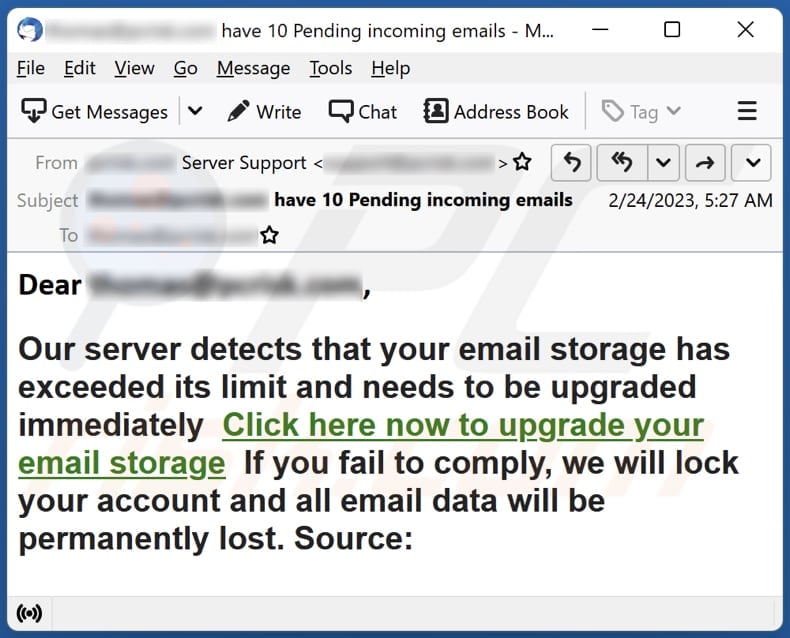
More about the "Email Storage Has Exceeded Its Limit" scam email
This letter notifies recipients of an issue with their email storage limit. It implies that recipients have 10 unread messages waiting for them. Also, this email informs recipients that their email storage has surpassed its limit and requires an immediate upgrade.
The email includes a hyperlink that prompts recipients to upgrade their storage by clicking on it. Additionally, the email warns that if recipients do not comply with the request, their accounts will be locked, and all email data will be permanently lost.
The hyperlink provided in the email that says "Click here now to upgrade your email storage" leads recipients to a phishing website that masquerades as a legitimate login page. The phishing website is designed to imitate the appearance of the recipient's email service provider. For example, a Gmail user would be directed to a fake Gmail login page.
The aim of this phishing page is to mislead individuals (who received the email) into disclosing their login credentials (email address and password). If successful, cybercriminals can use stolen email accounts for numerous malicious activities.
For example, they can search for confidential data such as banking records, personal contacts, and credit card details. It is important to mention that scammers can try to use the stolen login credentials to access (and steal) other accounts.
| Name | Email Storage Has Exceeded Its Limit Scam |
| Threat Type | Phishing, Scam, Social Engineering, Fraud |
| Fake Claim | Email storage has surpassed its limit |
| Disguise | Letter from an email service provider |
| Symptoms | Unauthorized online purchases, changed online account passwords, identity theft, illegal access of the computer. |
| Distribution methods | Deceptive emails, rogue online pop-up ads, search engine poisoning techniques, misspelled domains. |
| Damage | Loss of sensitive private information, monetary loss, identity theft. |
| Malware Removal (Windows) |
To eliminate possible malware infections, scan your computer with legitimate antivirus software. Our security researchers recommend using Combo Cleaner. Download Combo CleanerTo use full-featured product, you have to purchase a license for Combo Cleaner. 7 days free trial available. Combo Cleaner is owned and operated by RCS LT, the parent company of PCRisk.com. |
Similar scam emails in general
Phishing emails often use urgent or threatening language to make the recipient act impulsively without thinking critically. Also, they usually contain links or attachments that are meant to trick the recipient into disclosing personal information.
Scammers use such emails to trick recipients into disclosing personal information, such as their usernames, passwords, credit card details, etc. Examples of phishing emails are "TREZOR Assets Might Be At Risk!", "We Are Closing All Old Versions Of Email", and "Societe Generale (SG)". Emails can also be used to deliver malware.
How do spam campaigns infect computers?
Emails can contain links that redirect recipients to a malicious website that can infect their computers with malware. Also, cybercriminals can attach malware-infected files to emails that, when opened, can infect computer with malicious software. Thus, users infect computers via malicious sites or files.
Threat actors often use malicious MS Office, PDF documents, JavaScript files, executables, archives, ISO files, and other files to trick users into executing malware.
How to avoid installation of malware?
It is recommended to download software only from official pages and reputable app stores and avoid downloading from other sources that may be risky. Keeping both your computer and installed programs up to date is also important. It is advised to be cautious when opening links or files in emails, especially if they are irrelevant or sent from unknown addresses.
Additionally, it is advisable not to trust advertisements on suspicious pages and scan your computer regularly for potential threats. If you have already opened malicious attachments, we recommend running a scan with Combo Cleaner Antivirus for Windows to automatically eliminate infiltrated malware.
Text presented in the "Email Storage Has Exceeded Its Limit" email letter:
Subject: - have 10 Pending incoming emails
Dear -,
Our server detects that your email storage has exceeded its limit and needs to be upgraded immediately Click here now to upgrade your email storage If you fail to comply, we will lock your account and all email data will be permanently lost. Source:
Screenshot of the phishing website:
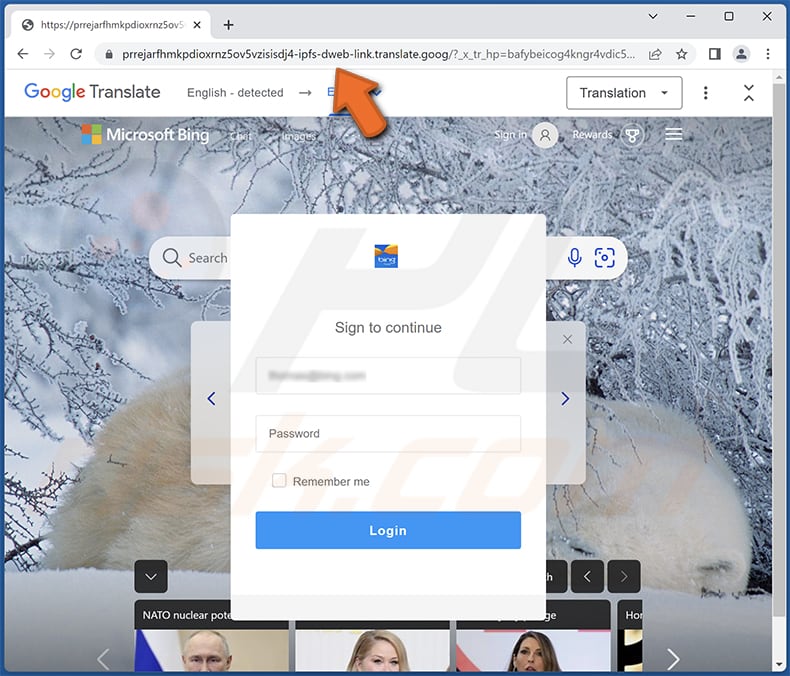
Another example of an email storage-themed spam promoting a phishing site designed to imitate recipient's email provider:
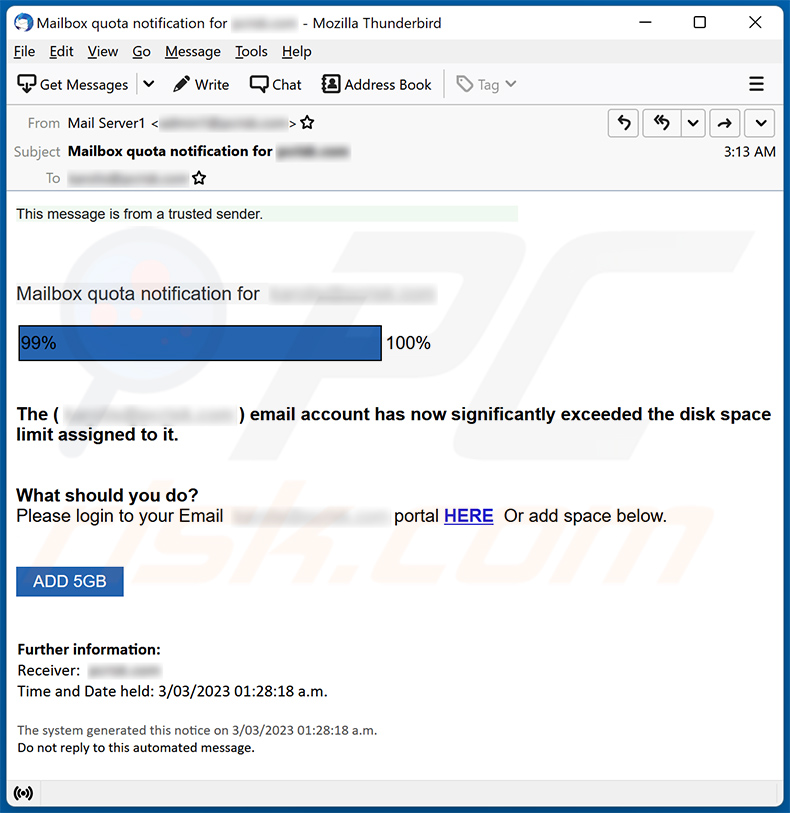
Text presented within:
Subject: Mailbox quota notification for ********
This message is from a trusted sender.Mailbox quota notification for ********
99% 100%The ( ******** ) email account has now significantly exceeded the disk space limit assigned to it.
What should you do?
Please login to your Email ******** portal HERE Or add space below.ADD 5GB
Further information:
Receiver: ********
Time and Date held: 3/03/2023 01:28:18 a.m.
The system generated this notice on 3/03/2023 01:28:18 a.m.
Do not reply to this automated message.
Screenshot of the promoted phishing site:
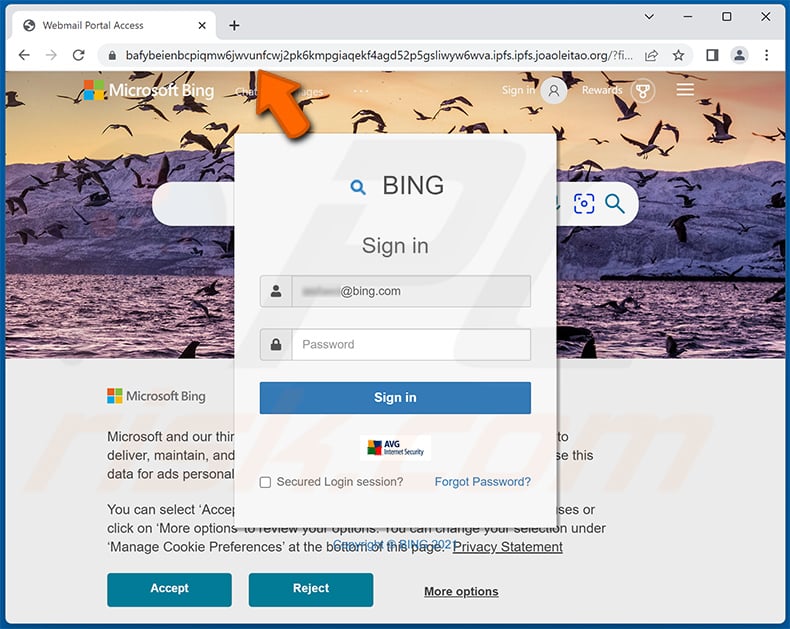
Yet another example of email storage-themed spam:
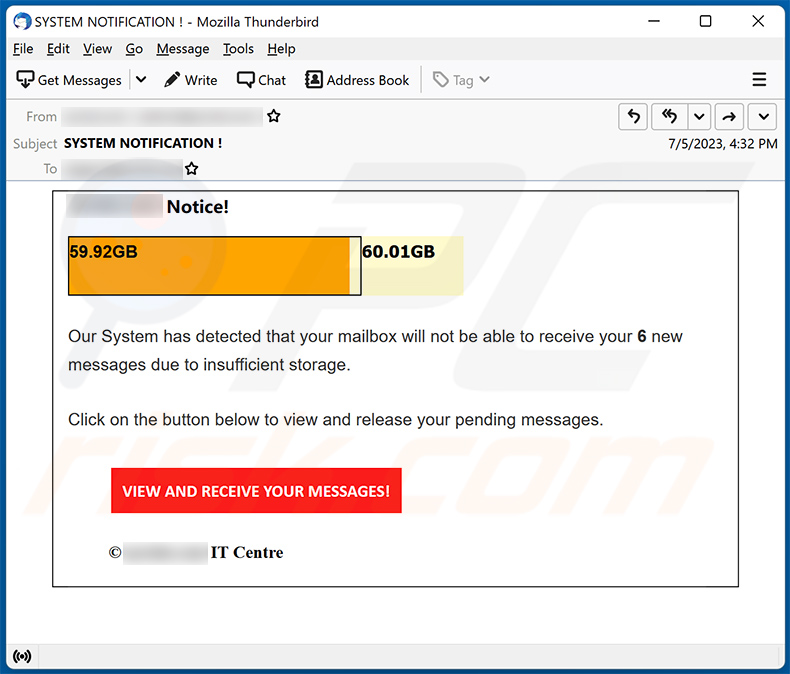
Text presented within:
Subject: SYSTEM NOTIFICATION !
- Notice!
59.92GB 60.01GBOur System has detected that your mailbox will not be able to receive your 6 new messages due to insufficient storage.
Click on the button below to view and release your pending messages.
VIEW AND RECEIVE YOUR MESSAGES!
© - IT Centre
Yet another example of an email from "Email Storage Has Exceeded Its Limit" spam campaign:
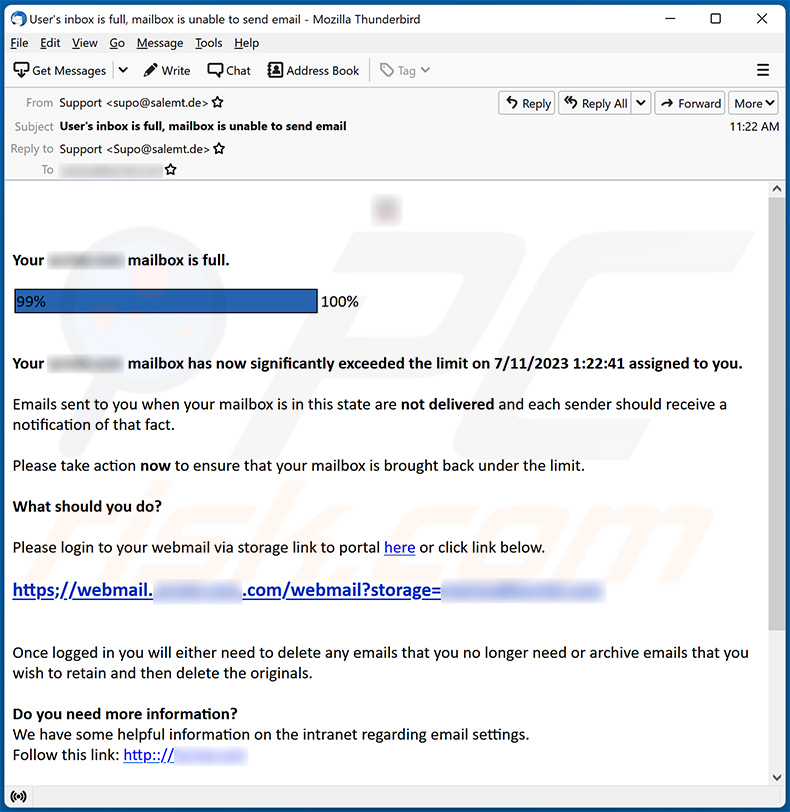
Text presented within:
Subject: User's inbox is full, mailbox is unable to send email
********
Your ******** mailbox is full.
99% 100%
Your ******** mailbox has now significantly exceeded the limit on 7/11/2023 1:22:41 assigned to you.Emails sent to you when your mailbox is in this state are not delivered and each sender should receive a notification of that fact.
Please take action now to ensure that your mailbox is brought back under the limit.
What should you do?
Please login to your webmail via storage link to portal here or click link below.
hxxps;//webmail.********.com/webmail?storage=********
Once logged in you will either need to delete any emails that you no longer need or archive emails that you wish to retain and then delete the originals.Do you need more information?
We have some helpful information on the intranet regarding email settings.
Follow this link: hxxp:://********--
******** Support Department
Yet another example of an email from "Email Storage Has Exceeded Its Limit" spam campaign:
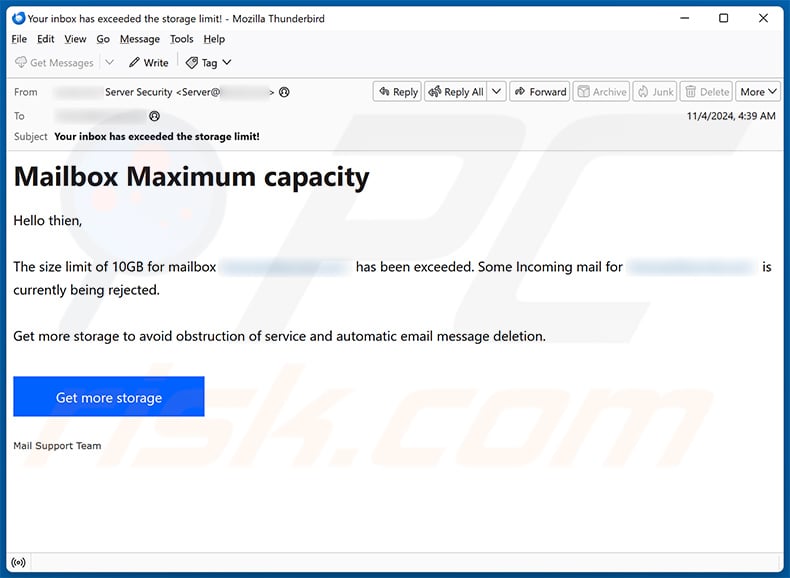
Text presented within:
Subject: Your inbox has exceeded the storage limit!
Mailbox Maximum capacity
Hello thien,The size limit of 10GB for mailbox '******** ' has been exceeded. Some Incoming mail for '******** ' is currently being rejected.
Get more storage to avoid obstruction of service and automatic email message deletion.
Get more storage
Mail Support Team
Instant automatic malware removal:
Manual threat removal might be a lengthy and complicated process that requires advanced IT skills. Combo Cleaner is a professional automatic malware removal tool that is recommended to get rid of malware. Download it by clicking the button below:
DOWNLOAD Combo CleanerBy downloading any software listed on this website you agree to our Privacy Policy and Terms of Use. To use full-featured product, you have to purchase a license for Combo Cleaner. 7 days free trial available. Combo Cleaner is owned and operated by RCS LT, the parent company of PCRisk.com.
Quick menu:
- What is Email Storage Has Exceeded Its Limit phishing email?
- Types of malicious emails.
- How to spot a malicious email?
- What to do if you fell for an email scam?
Types of malicious emails:
![]() Phishing Emails
Phishing Emails
Most commonly, cybercriminals use deceptive emails to trick Internet users into giving away their sensitive private information, for example, login information for various online services, email accounts, or online banking information.
Such attacks are called phishing. In a phishing attack, cybercriminals usually send an email message with some popular service logo (for example, Microsoft, DHL, Amazon, Netflix), create urgency (wrong shipping address, expired password, etc.), and place a link which they hope their potential victims will click on.
After clicking the link presented in such email message, victims are redirected to a fake website that looks identical or extremely similar to the original one. Victims are then asked to enter their password, credit card details, or some other information that gets stolen by cybercriminals.
![]() Emails with Malicious Attachments
Emails with Malicious Attachments
Another popular attack vector is email spam with malicious attachments that infect users' computers with malware. Malicious attachments usually carry trojans that are capable of stealing passwords, banking information, and other sensitive information.
In such attacks, cybercriminals' main goal is to trick their potential victims into opening an infected email attachment. To achieve this goal, email messages usually talk about recently received invoices, faxes, or voice messages.
If a potential victim falls for the lure and opens the attachment, their computers get infected, and cybercriminals can collect a lot of sensitive information.
While it's a more complicated method to steal personal information (spam filters and antivirus programs usually detect such attempts), if successful, cybercriminals can get a much wider array of data and can collect information for a long period of time.
![]() Sextortion Emails
Sextortion Emails
This is a type of phishing. In this case, users receive an email claiming that a cybercriminal could access the webcam of the potential victim and has a video recording of one's masturbation.
To get rid of the video, victims are asked to pay a ransom (usually using Bitcoin or another cryptocurrency). Nevertheless, all of these claims are false - users who receive such emails should ignore and delete them.
How to spot a malicious email?
While cyber criminals try to make their lure emails look trustworthy, here are some things that you should look for when trying to spot a phishing email:
- Check the sender's ("from") email address: Hover your mouse over the "from" address and check if it's legitimate. For example, if you received an email from Microsoft, be sure to check if the email address is @microsoft.com and not something suspicious like @m1crosoft.com, @microsfot.com, @account-security-noreply.com, etc.
- Check for generic greetings: If the greeting in the email is "Dear user", "Dear @youremail.com", "Dear valued customer", this should raise suspiciousness. Most commonly, companies call you by your name. Lack of this information could signal a phishing attempt.
- Check the links in the email: Hover your mouse over the link presented in the email, if the link that appears seems suspicious, don't click it. For example, if you received an email from Microsoft and the link in the email shows that it will go to firebasestorage.googleapis.com/v0... you shouldn't trust it. It's best not to click any links in the emails but to visit the company website that sent you the email in the first place.
- Don't blindly trust email attachments: Most commonly, legitimate companies will ask you to log in to their website and to view any documents there; if you received an email with an attachment, it's a good idea to scan it with an antivirus application. Infected email attachments are a common attack vector used by cybercriminals.
To minimise the risk of opening phishing and malicious emails we recommend using Combo Cleaner Antivirus for Windows.
Example of a spam email:

What to do if you fell for an email scam?
- If you clicked on a link in a phishing email and entered your password - be sure to change your password as soon as possible. Usually, cybercriminals collect stolen credentials and then sell them to other groups that use them for malicious purposes. If you change your password in a timely manner, there's a chance that criminals won't have enough time to do any damage.
- If you entered your credit card information - contact your bank as soon as possible and explain the situation. There's a good chance that you will need to cancel your compromised credit card and get a new one.
- If you see any signs of identity theft - you should immediately contact the Federal Trade Commission. This institution will collect information about your situation and create a personal recovery plan.
- If you opened a malicious attachment - your computer is probably infected, you should scan it with a reputable antivirus application. For this purpose, we recommend using Combo Cleaner Antivirus for Windows.
- Help other Internet users - report phishing emails to Anti-Phishing Working Group, FBI’s Internet Crime Complaint Center, National Fraud Information Center and U.S. Department of Justice.
Frequently Asked Questions (FAQ)
Why did I receive this email?
Scammers send identical emails to a large number of people, hoping that at least a few individuals will fall for their scam. These spam emails are never personalized.
I have provided my personal information when tricked by this email, what should I do?
In case you have disclosed any account credentials, it is advisable to change all passwords as soon as possible. If you have provided any other personal information, such as credit card details or ID card information, it is recommended that you contact the relevant authorities without delay.
I have downloaded and opened a malicious file attached to an email, is my computer infected?
If the file you opened is executable, then it is highly likely that your computer has been infected. However, if that file is a document in the form of a .pdf or .doc or a similar format, you may have avoided infection, as in some instances, merely opening the document is not sufficient for malware to penetrate the system.
I have read the email but did not open the attachment, is my computer infected?
No, merely opening an email is entirely benign.
Will Combo Cleaner remove malware infections that were present in email attachment?
Combo Cleaner has the ability to identify and remove almost all recognized forms of malware infections. However, it's important to note that sophisticated malware often conceals itself deeply within the system, necessitating a full system scan to locate and eliminate it.
Share:

Tomas Meskauskas
Expert security researcher, professional malware analyst
I am passionate about computer security and technology. I have an experience of over 10 years working in various companies related to computer technical issue solving and Internet security. I have been working as an author and editor for pcrisk.com since 2010. Follow me on Twitter and LinkedIn to stay informed about the latest online security threats.
PCrisk security portal is brought by a company RCS LT.
Joined forces of security researchers help educate computer users about the latest online security threats. More information about the company RCS LT.
Our malware removal guides are free. However, if you want to support us you can send us a donation.
DonatePCrisk security portal is brought by a company RCS LT.
Joined forces of security researchers help educate computer users about the latest online security threats. More information about the company RCS LT.
Our malware removal guides are free. However, if you want to support us you can send us a donation.
Donate
▼ Show Discussion